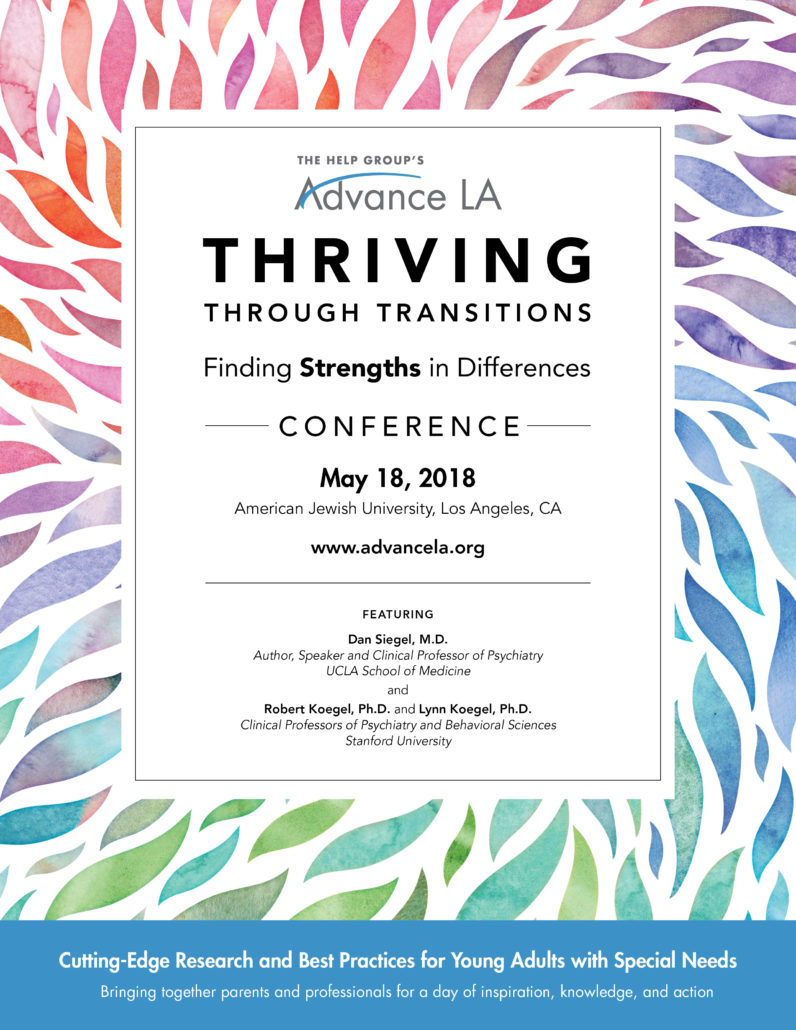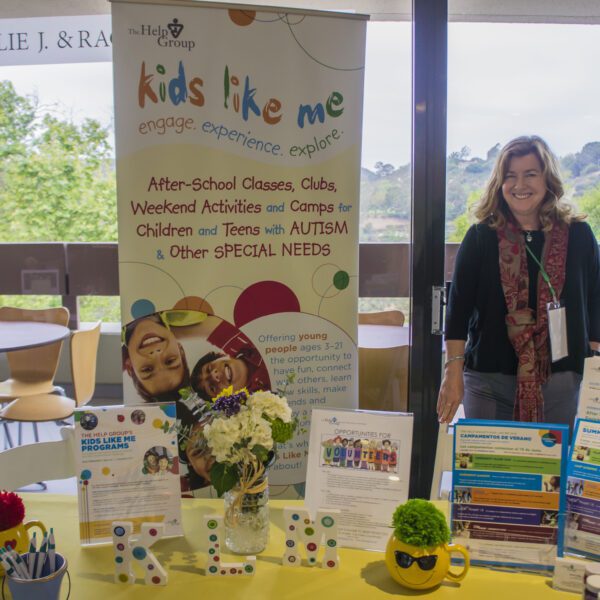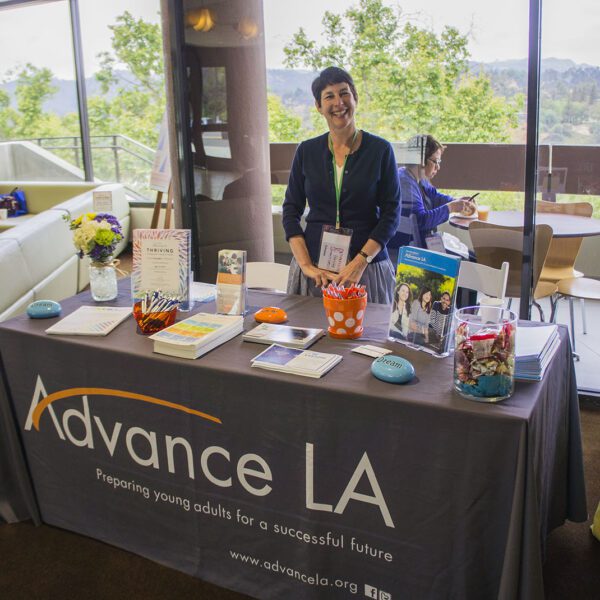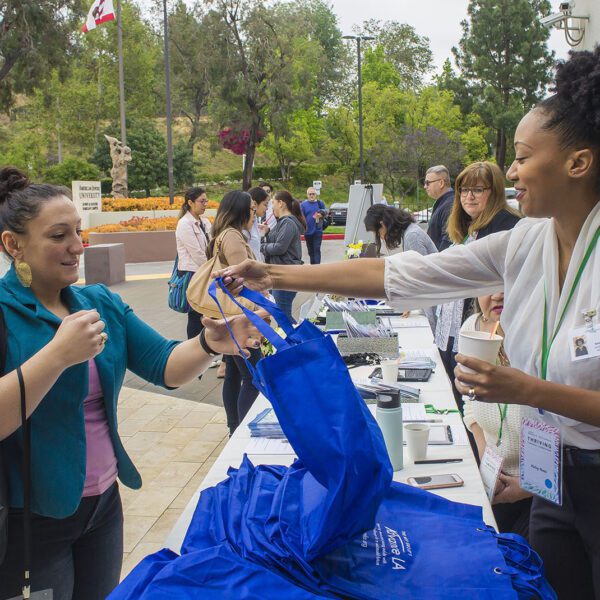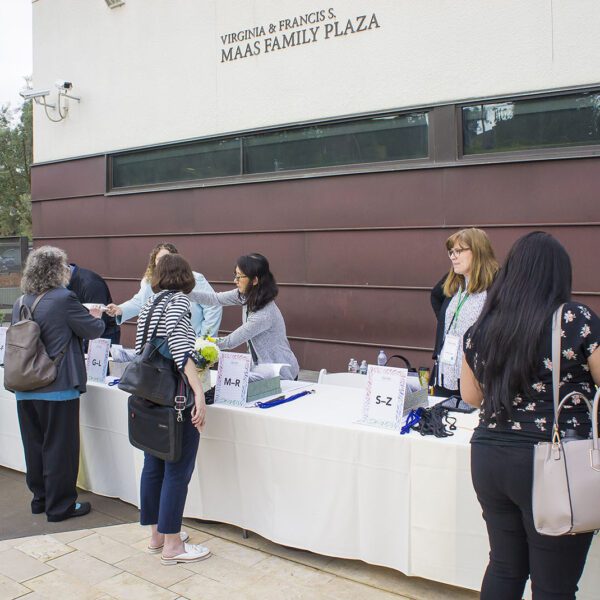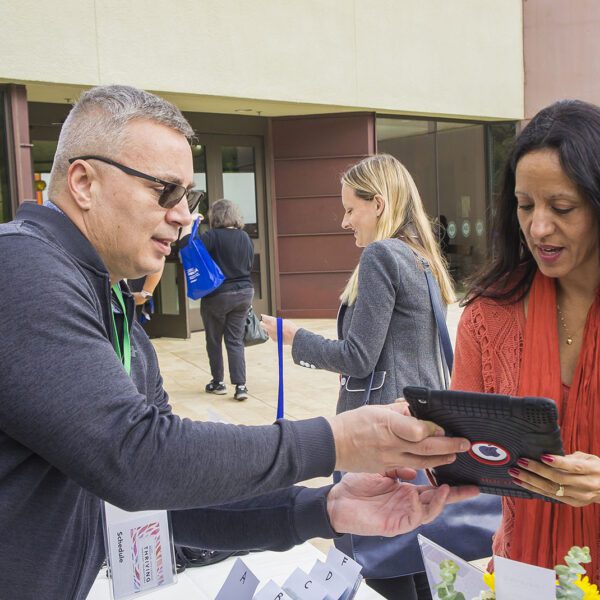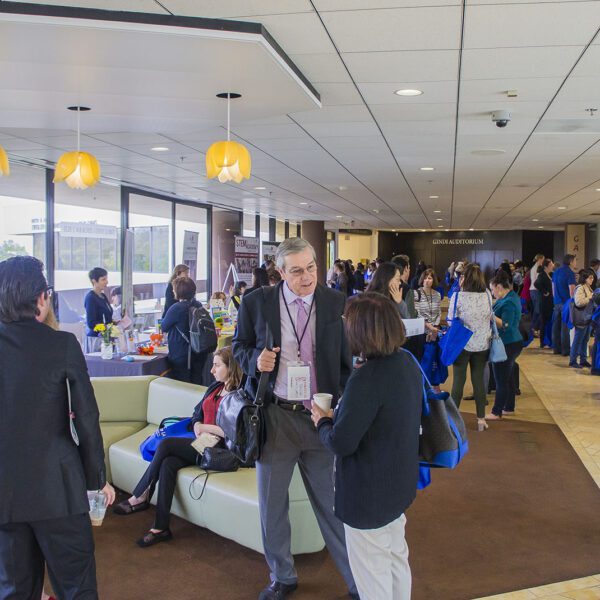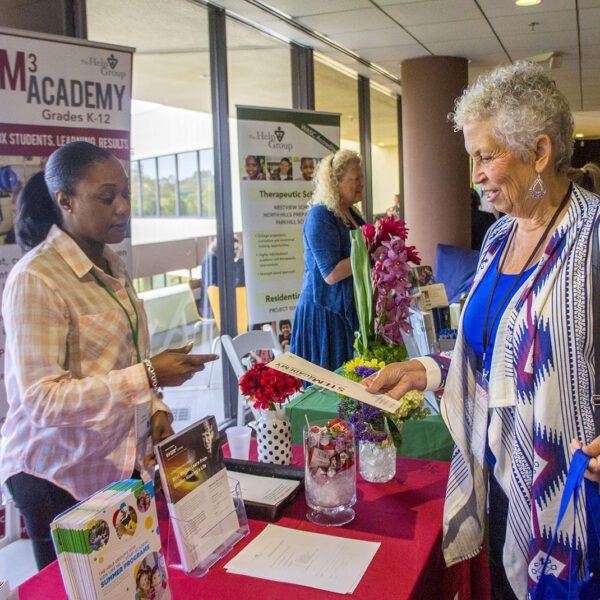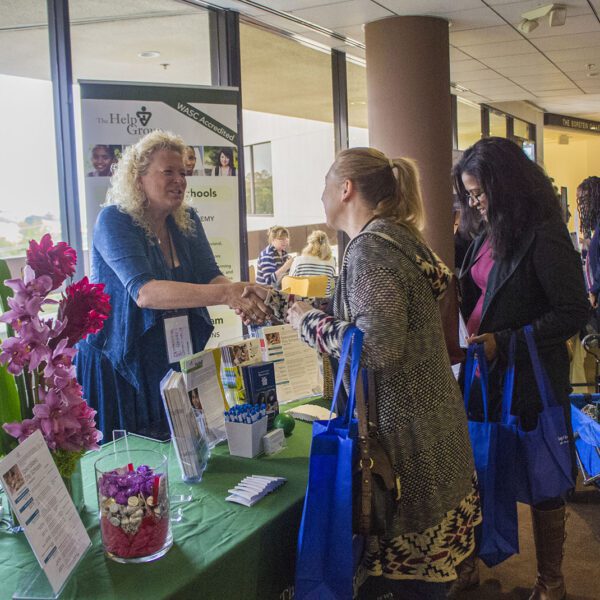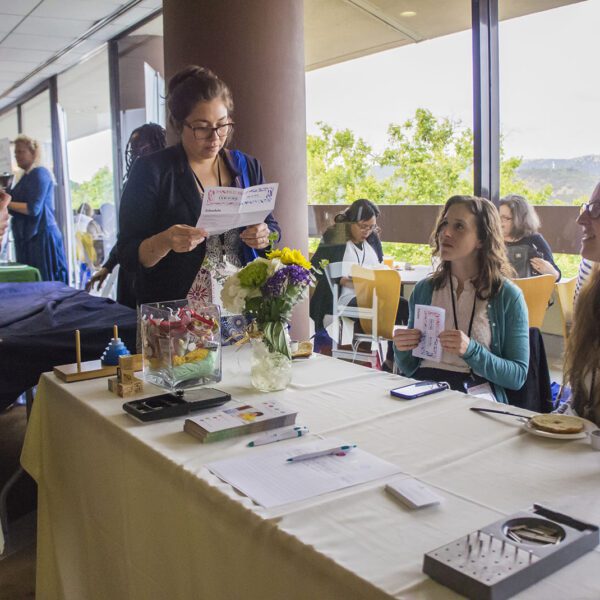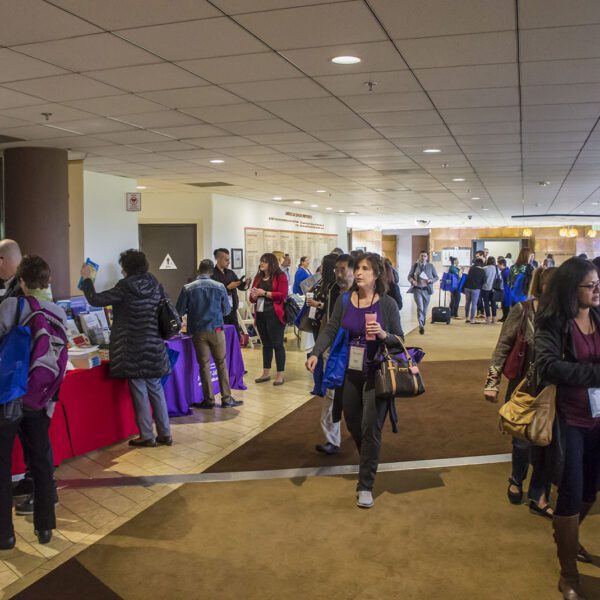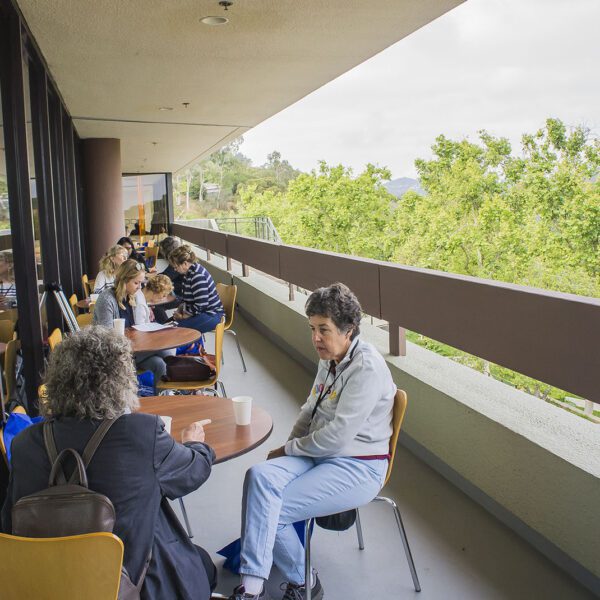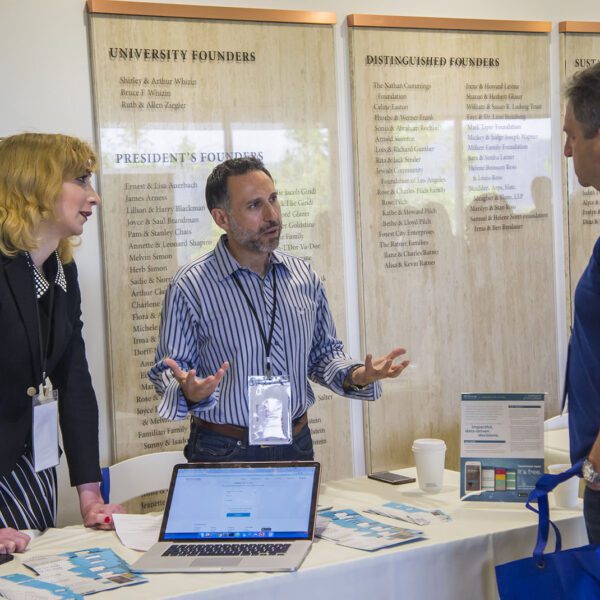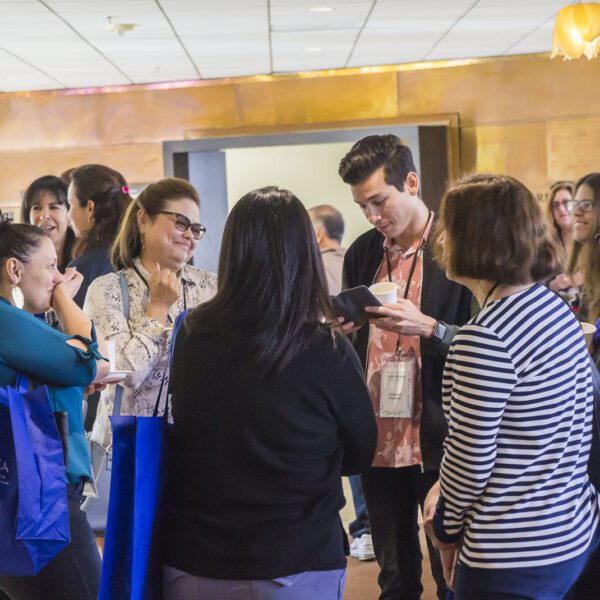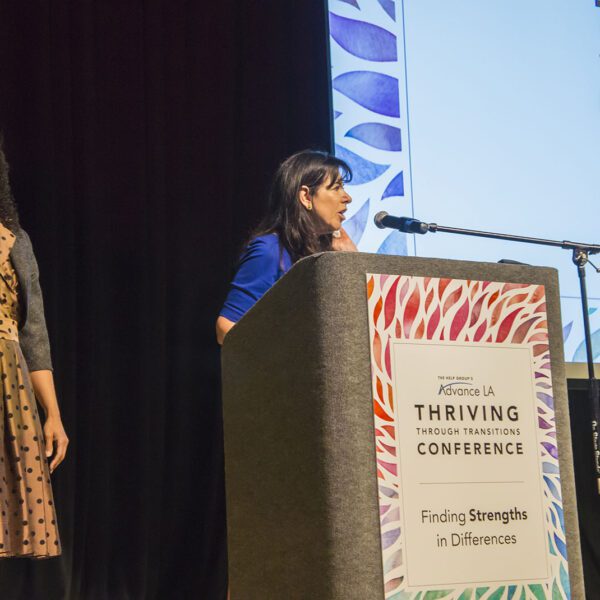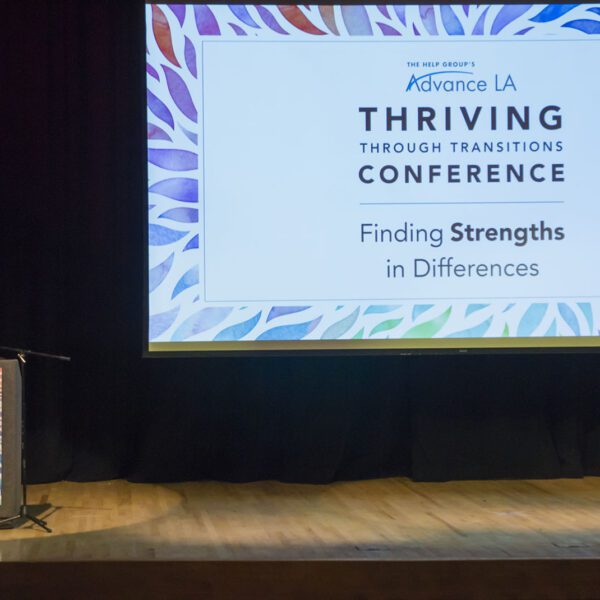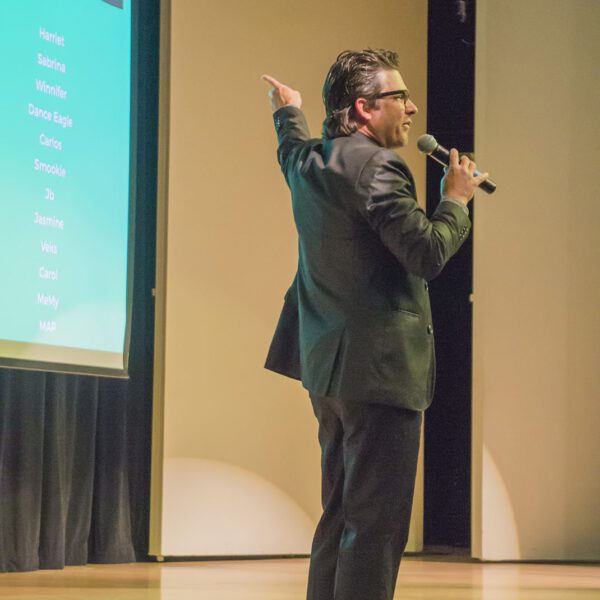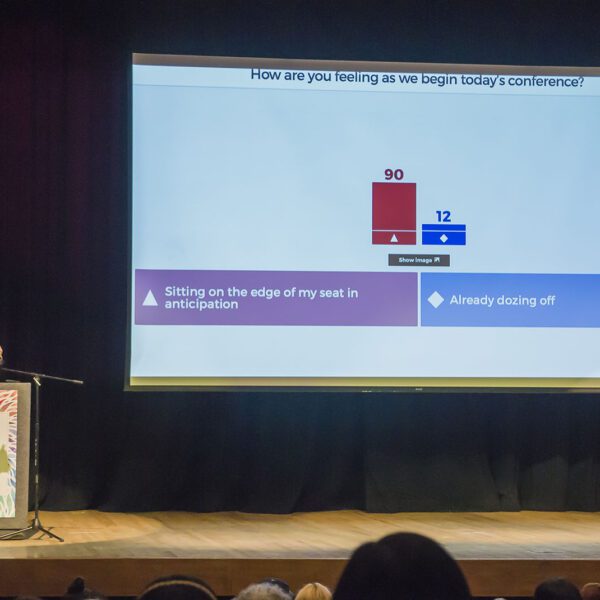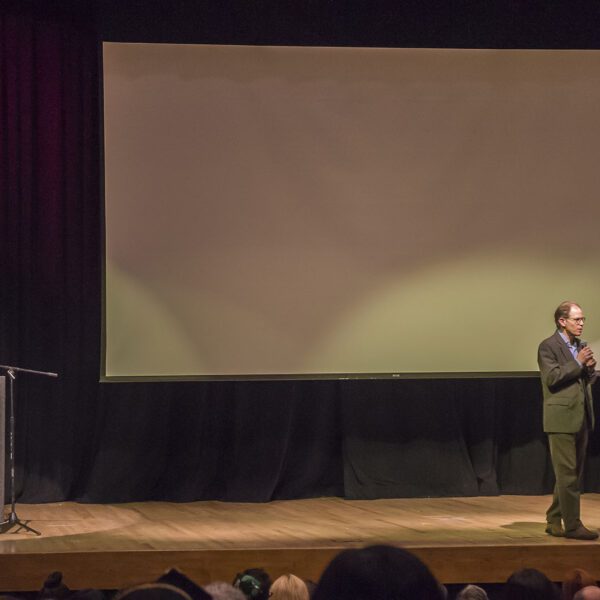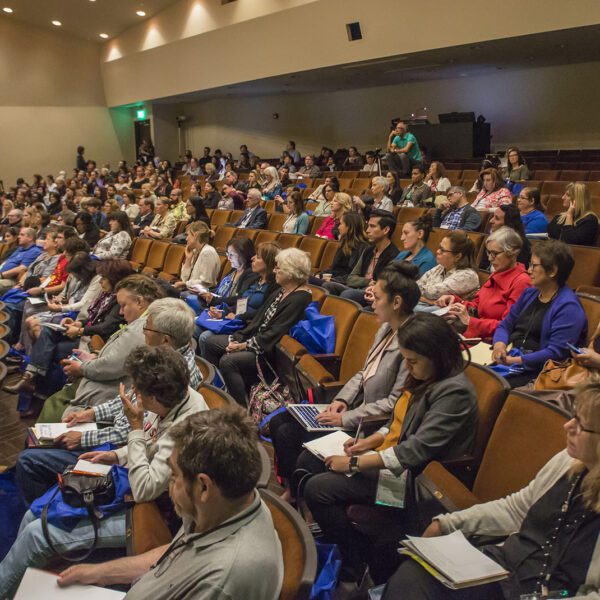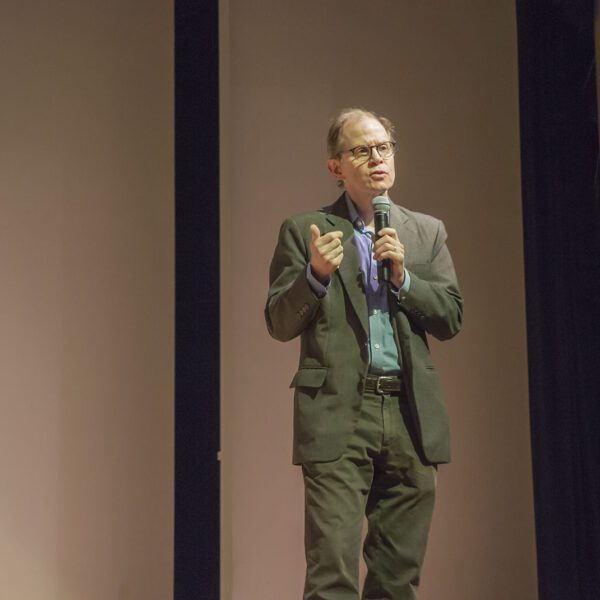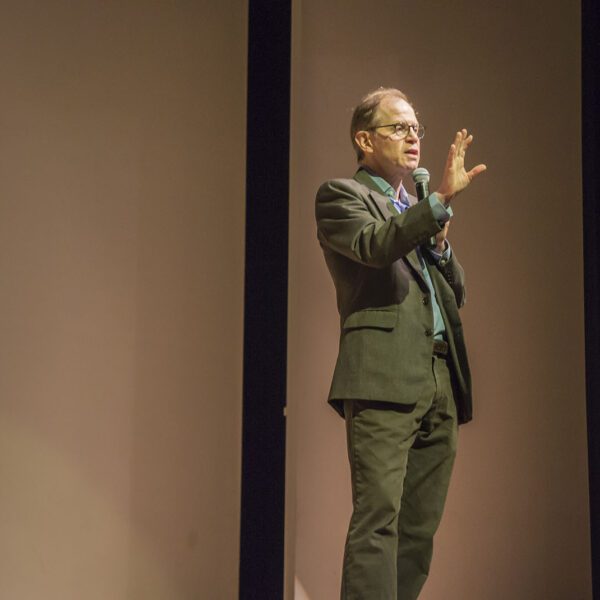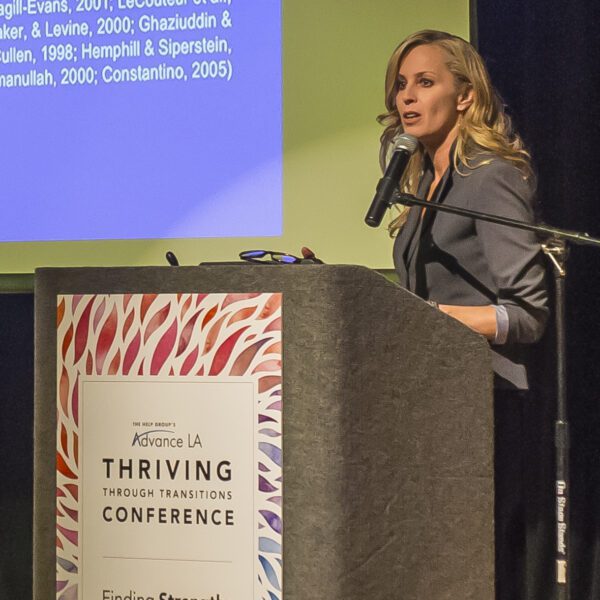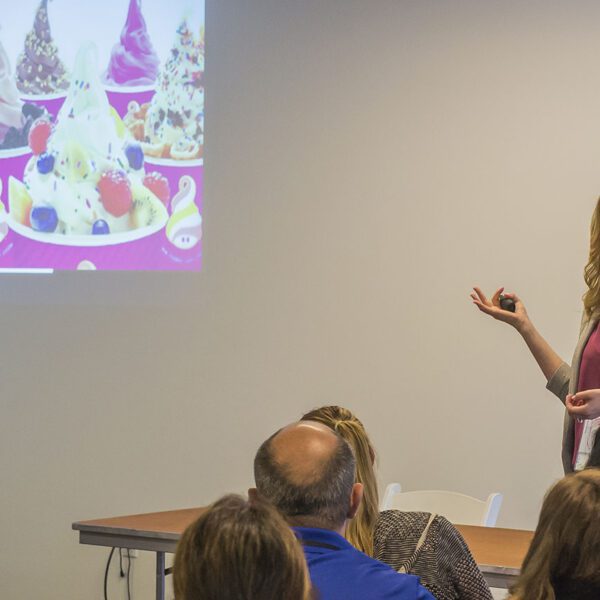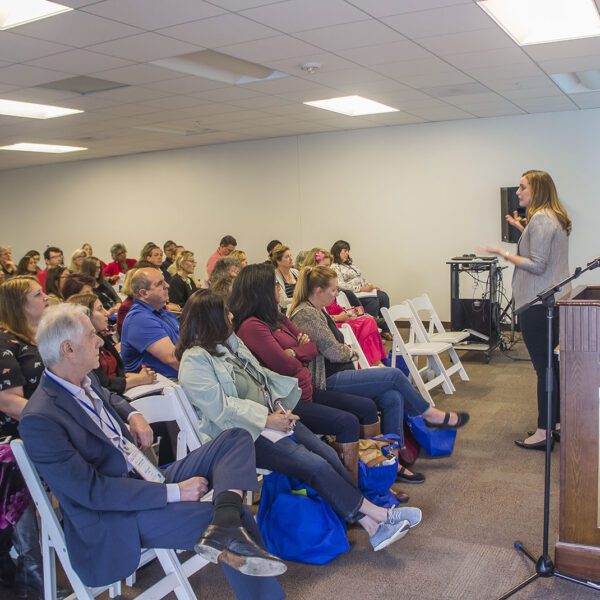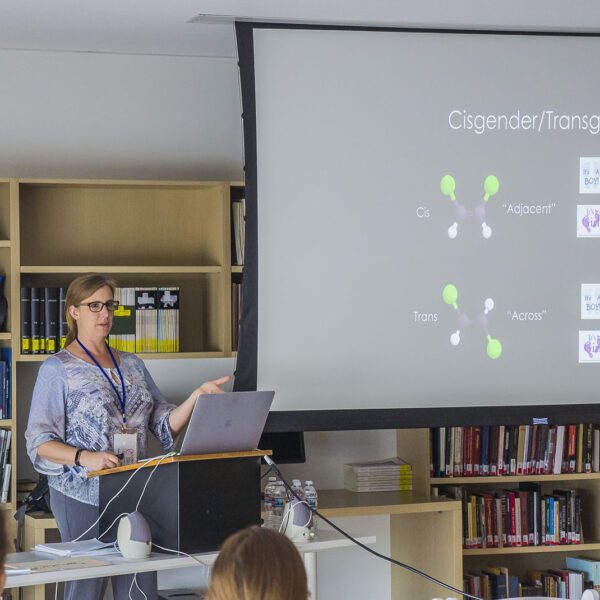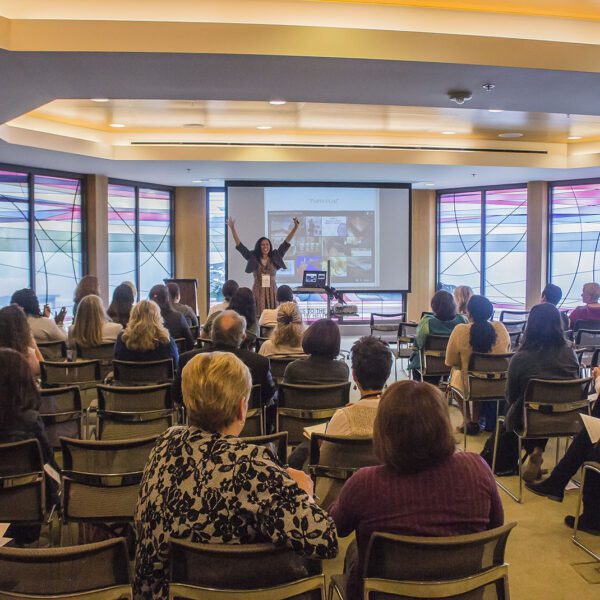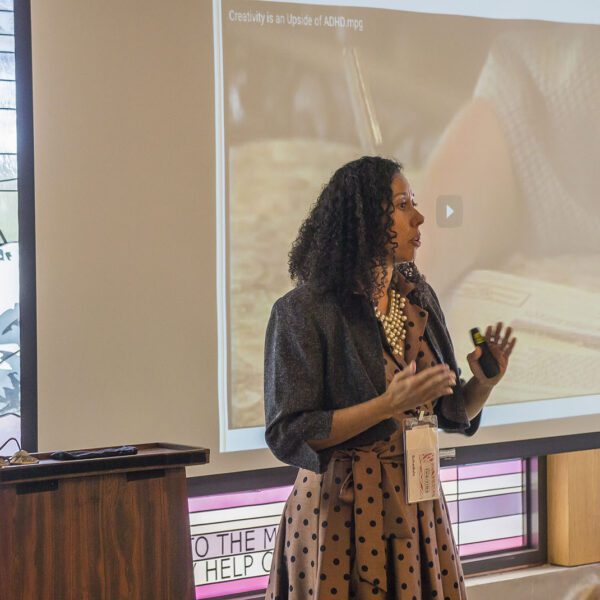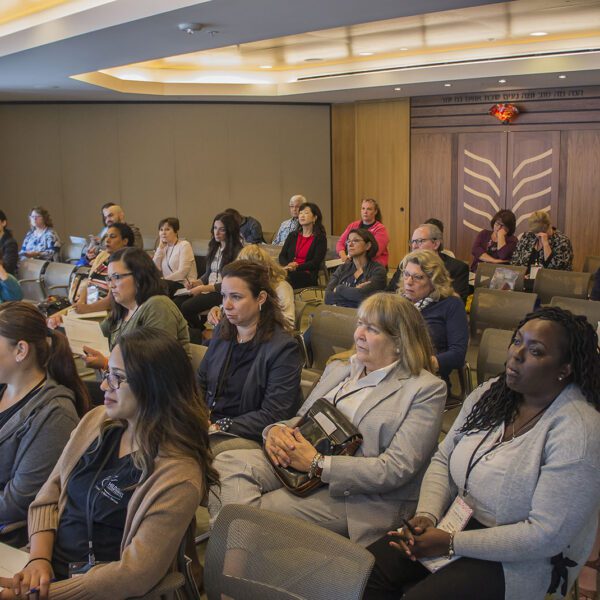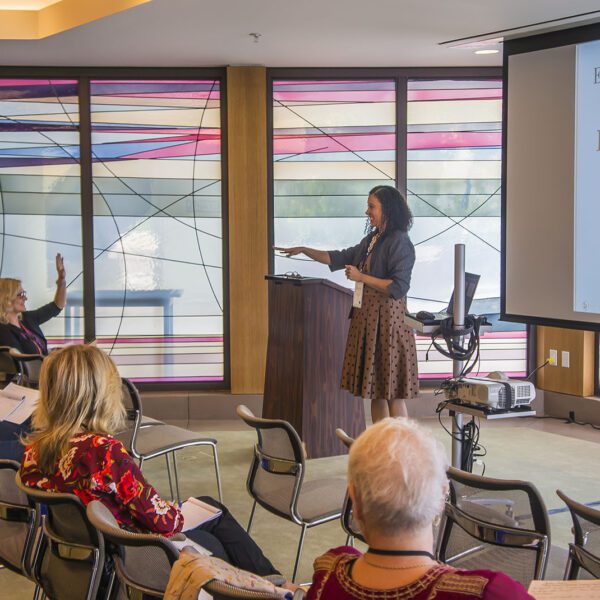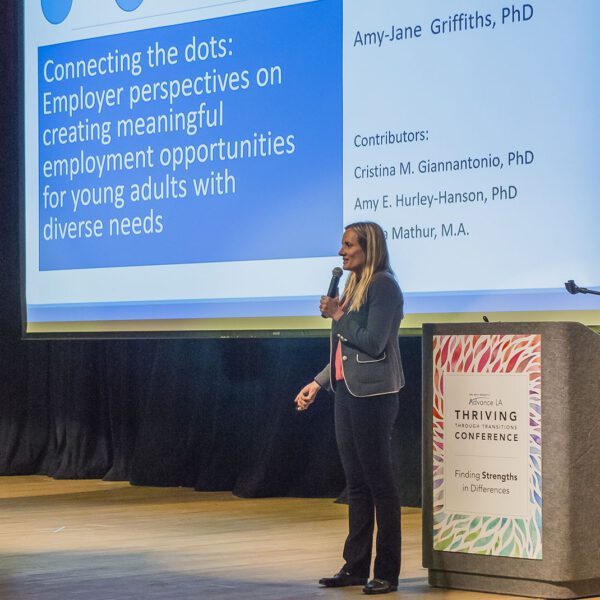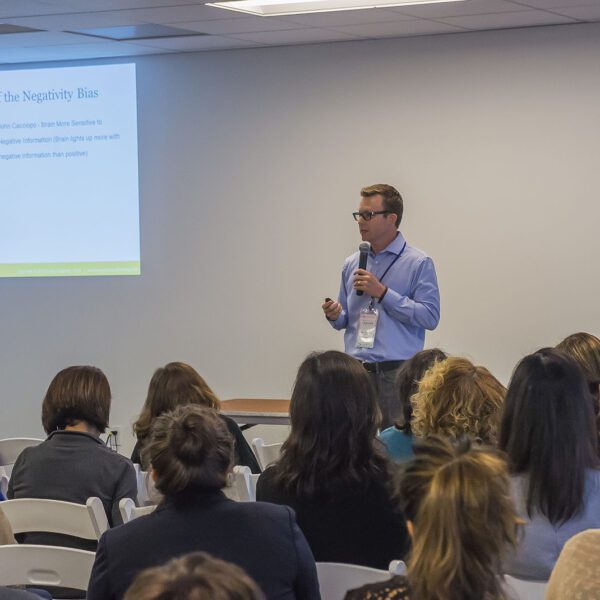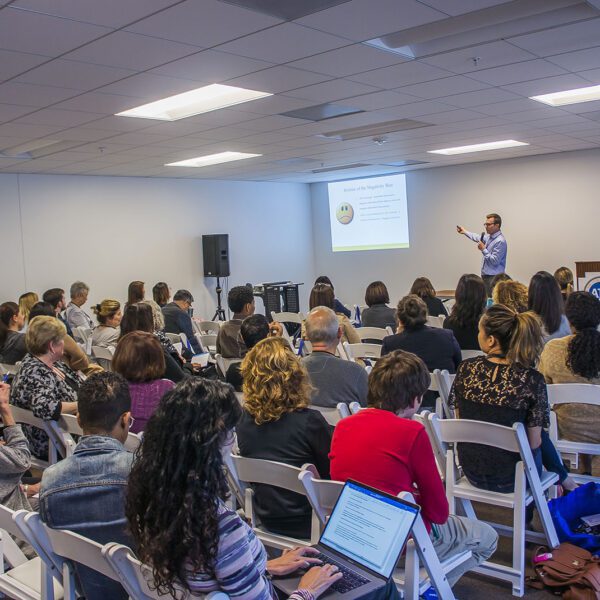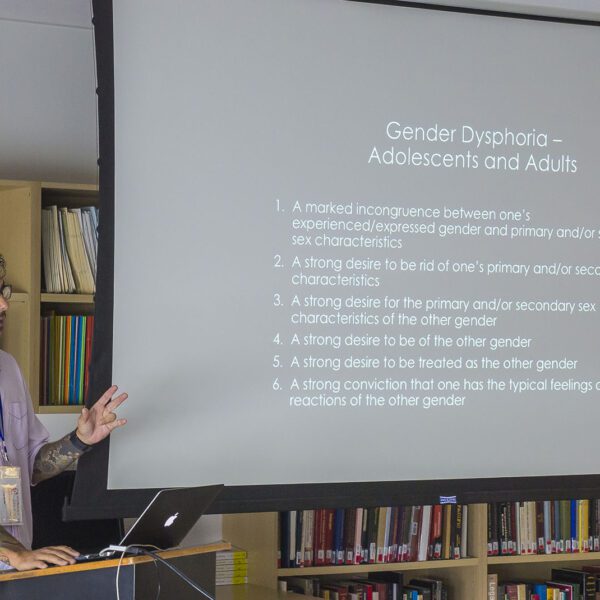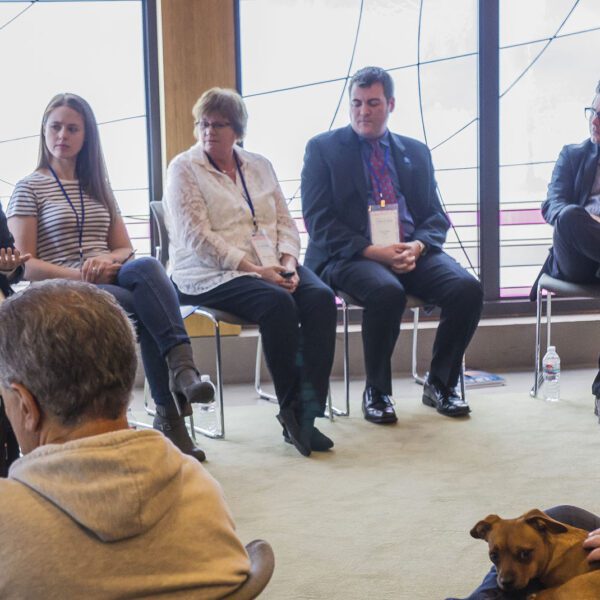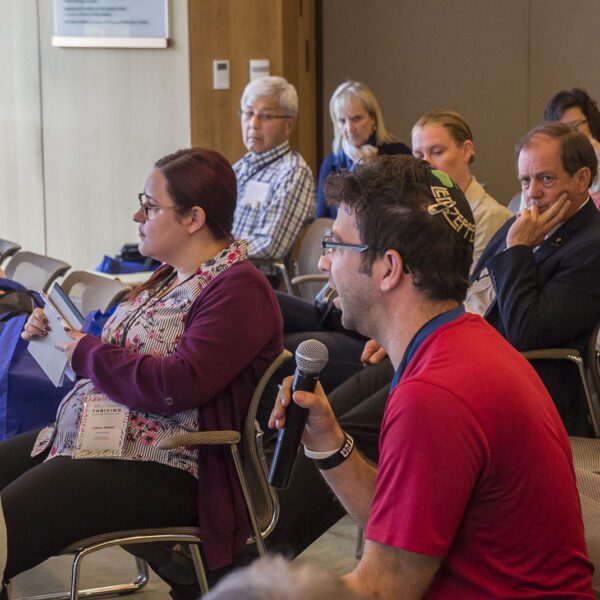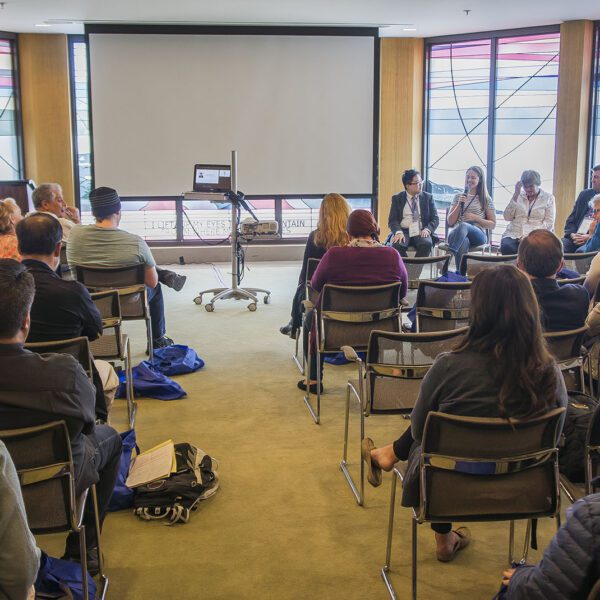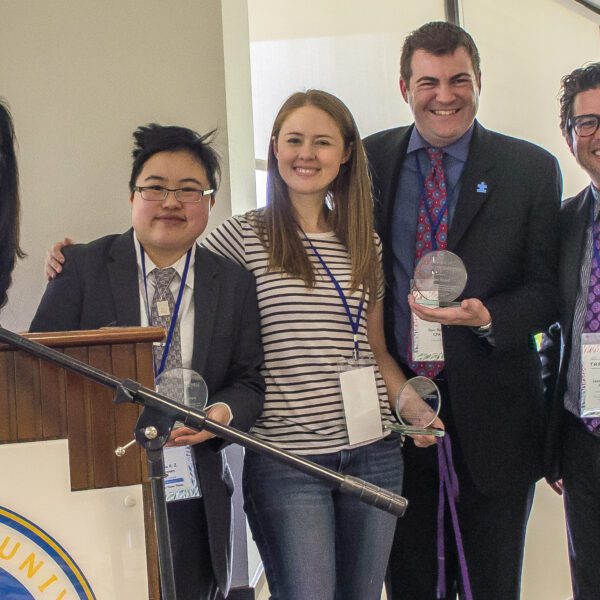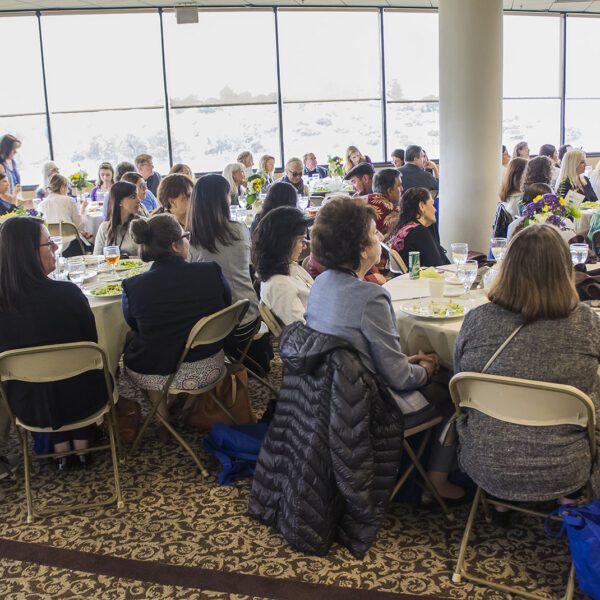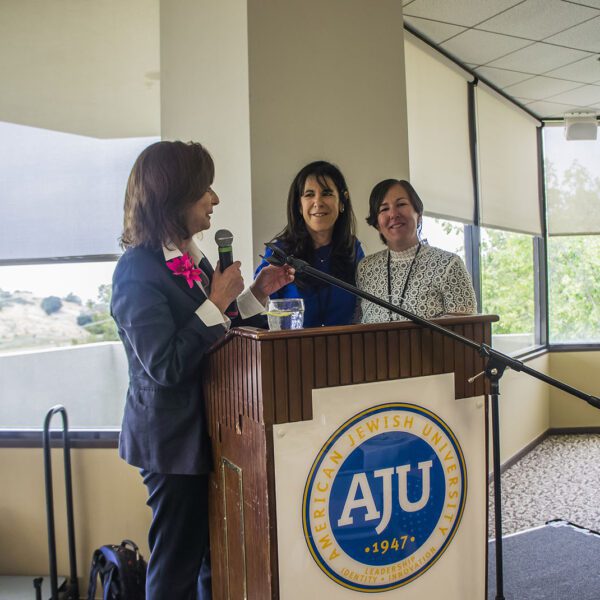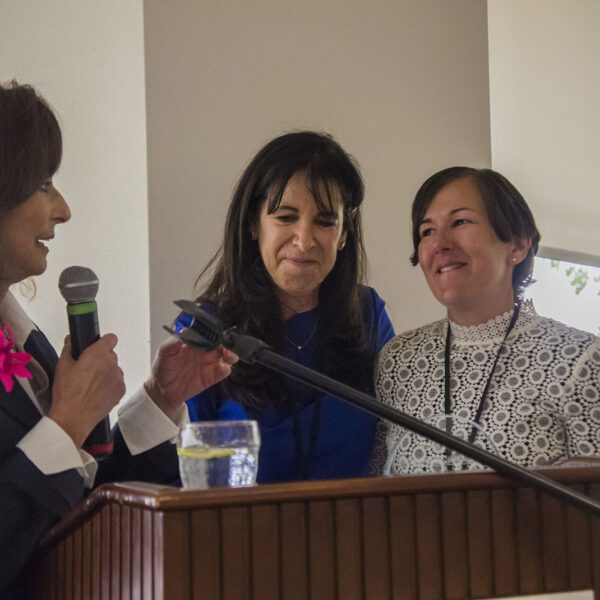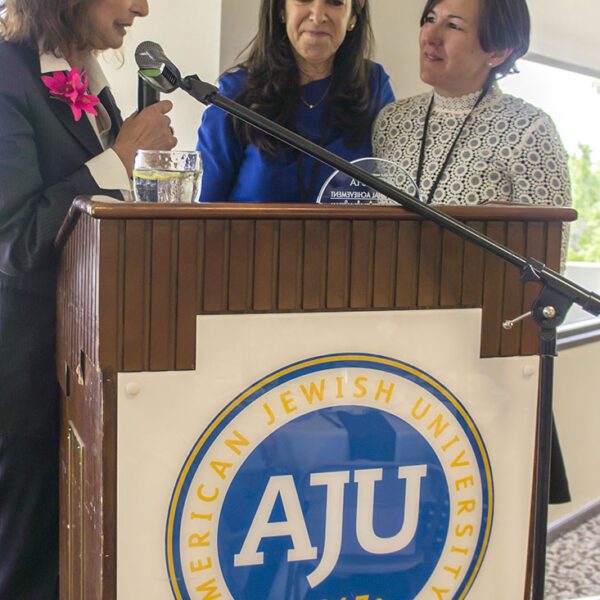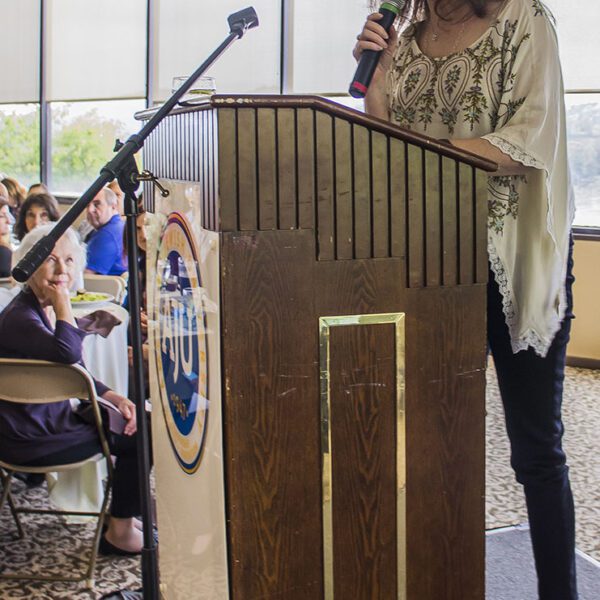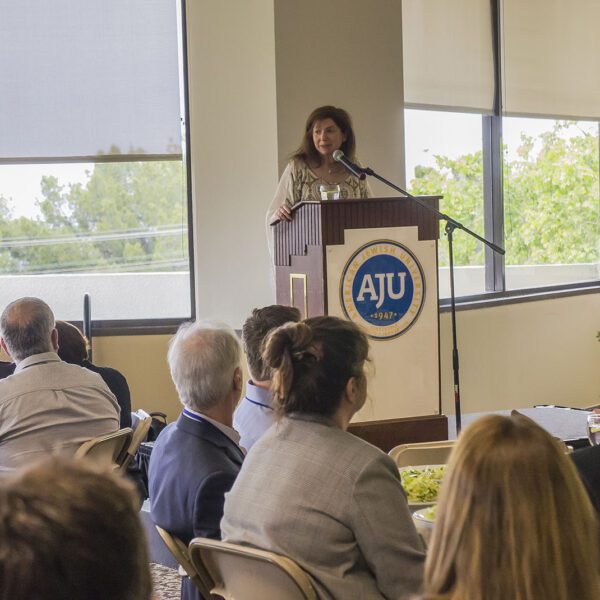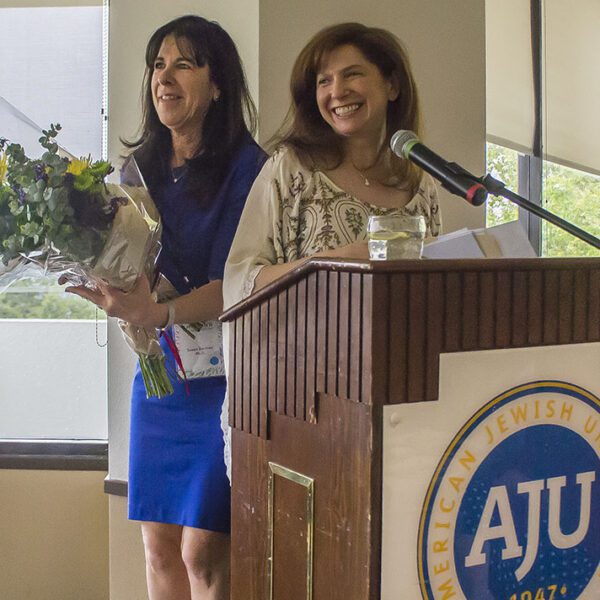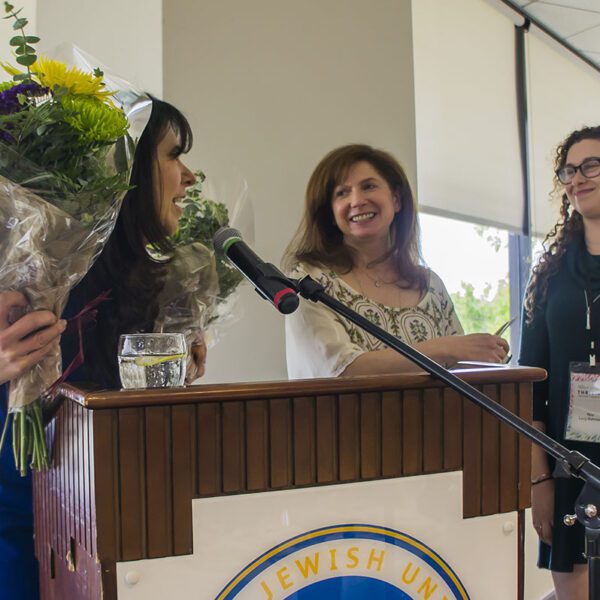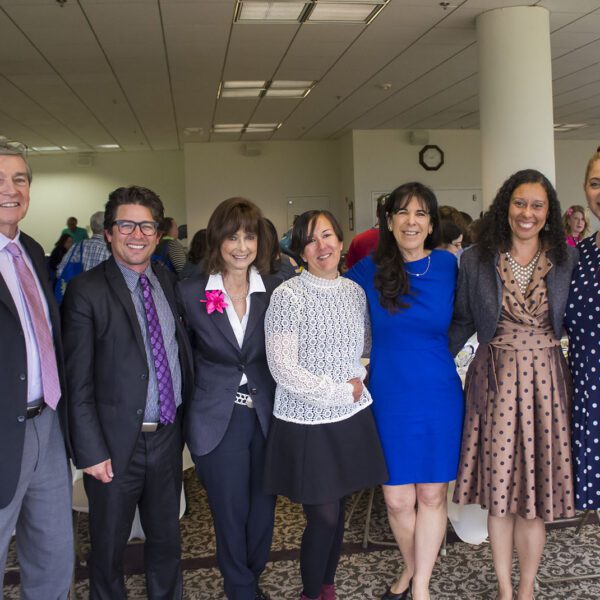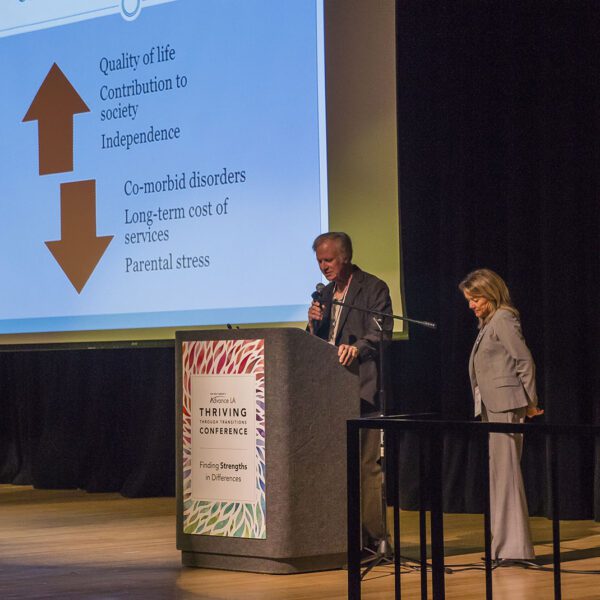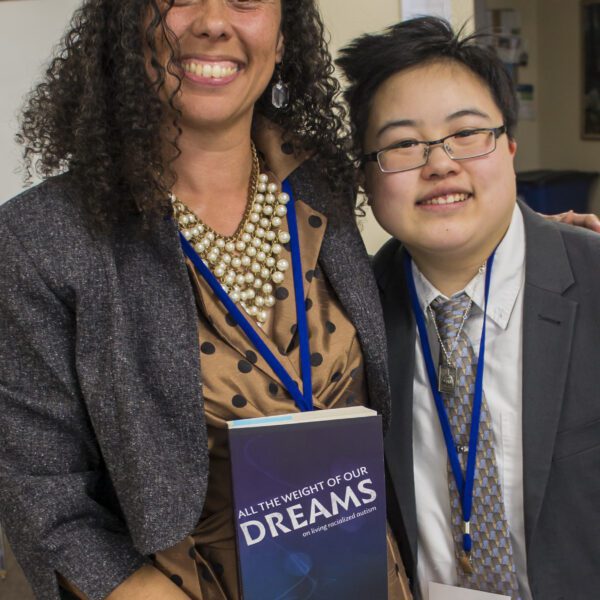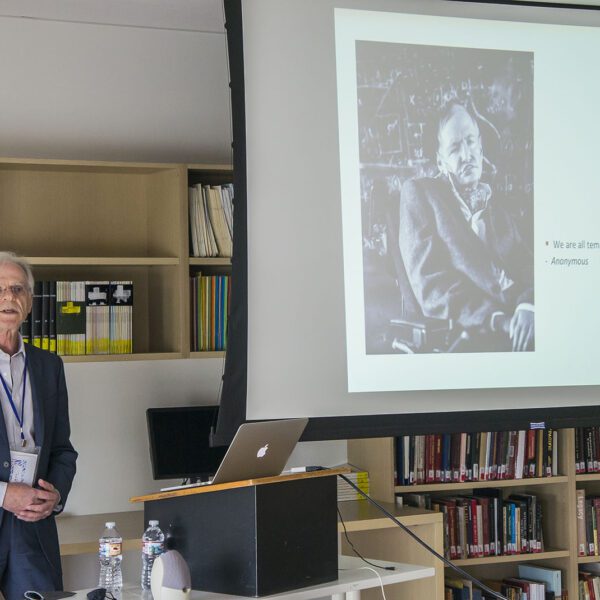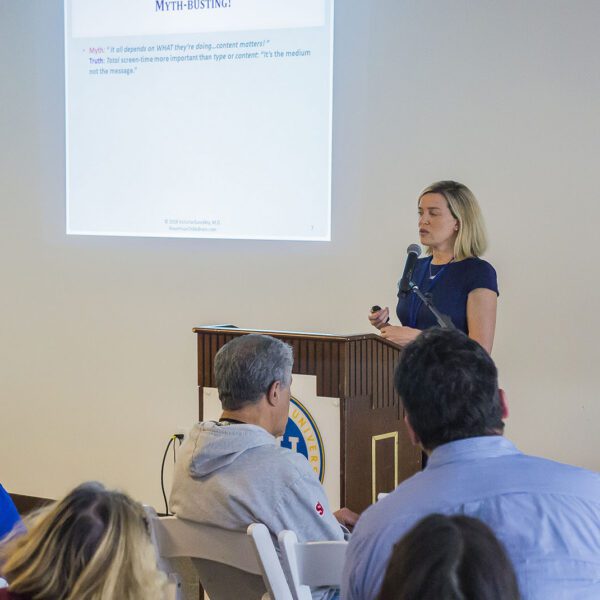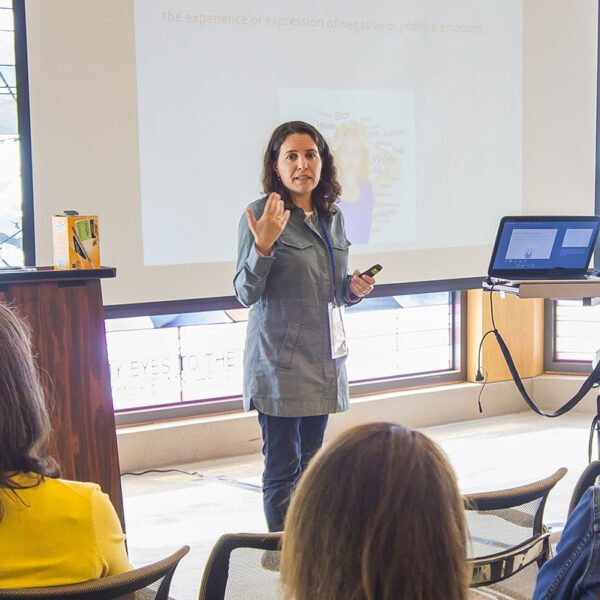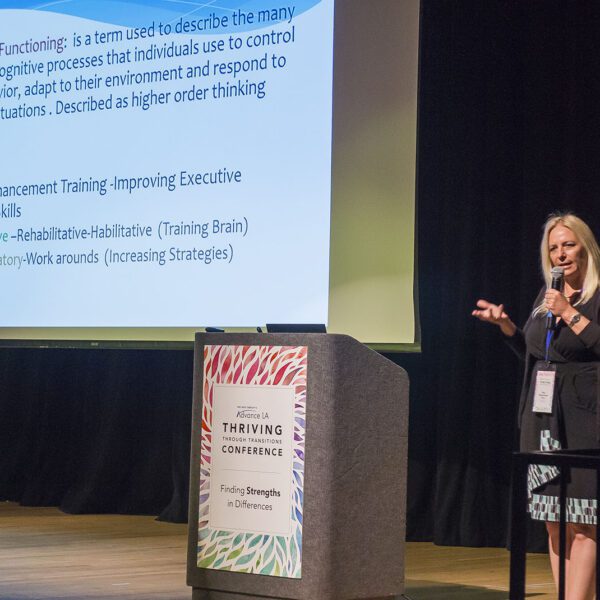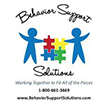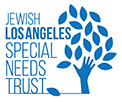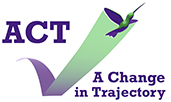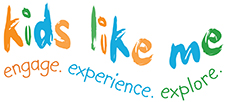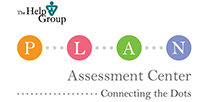Thriving Through Transitions: Finding Strengths in Differences
The Help Group’s 2018 Advance LA Conference, Thriving Through Transitions: Finding Strengths in Differences featured internationally prominent experts whose research and practice support young people with autism, learning differences and ADHD in their transition to college, the workplace and beyond. This year’s conference theme focused on neurodiversity and the many strengths young adults can harness as they transition to adulthood.
Friday, May 18, 2018
Our Keynote Speaker, Dr. Daniel Siegel, challenged popular misconceptions about the definition of the mind and spoke about “mindsight”, a term he coined which reflects our capacity to perceive the mind of the self and others. Through this powerful lens, he posits that we can understand our inner lives with more clarity, integrate the brain, and enhance our relationships with others.
In addition to Dr. Siegel, other featured speakers included Dr. Robert Koegel and Dr. Lynn Koegel, Luncheon Speaker Rabbi Naomi Levy, and returning presenters Dr. Liz Laugeson, Dr. Amy Griffiths and Dr. Elisha Goldstein. Presentations included topics on executive functioning, social connections, decreasing barriers to education and employment, finding purpose, electronic fasting, and gender dysphoria. There was also a highly attended panel with young adults discussing their unique stories and their strengths in differences.
Session Descriptions
KEYNOTE SPEAKER
Brainstorm: The Power and Purpose of the Teen and Young Adult Brain
Dan Siegel, M.D.
Level: Intermediate; Audience: General
In this presentation we will explore the nature of the changes in the teenage brain and how they set the stage for changes in adolescent mental, physical, and interpersonal well-being. We will explore the increased risk-taking and statistically demonstrated heightened chances of harm during this period of life. But these negative aspects of adolescence are only one side of the coin of this period of life. Seen from an inside view, adolescence is an essential part of our development and our evolution. This “inside out approach” to the second dozen years of life gives us an exciting new perspective on the essence of adolescence: Emotional intensity, social engagement, novelty-seeking, and creative explorations are not aspects of an “immature” stage of development but actually can be seen as a necessary set of characteristics that are essential for both the individual’s development and for the health and adaptation of our species. Further, these features of the teenage brain set the stage for changes that not only shape our life as adolescents, but can surprisingly be seen as essential to thriving in adulthood. How we approach adolescence as a period and adolescents as individuals can make all the difference in how these important years are navigated well.
Learning Objectives – At the end of this session, participants will be able to:
- Identify changes in the teenage brain responsible for increased risk taking
- Outline how integration in the brain during adolescence promotes gist-thinking
- Name four essential aspects of adolescence
- Describe an integrated relationship
SESSION 1
A.
The Next Frontier: Neurodiversity in the Workplace
Lindsey Sterling, Ph.D.
Level: Intermediate; Audience: General
This session will discuss the concept of neurodiversity and present ASD as a form of neurodivergence. Strengths and challenges often observed in ASD will be framed in terms of human variation. Diverse characteristics will be discussed within the context of a work environment, highlighting ways in which individuals with ASD can capitalize on strengths to contribute to the workplace. Implications for employment will be discussed.
Learning Objectives – At the end of this session, participants will be able to:
- Define the term Neurodiversity
- Explain how Neurodiversity applies to ASD
- Discuss strengths and challenges in ASD that can be framed in terms of human variation
- Identify at least three ways in which strengths in ASD can contribute to the workplace
- Identify at least two implications for employment in ASD
B.
Thriving Through Friendships: Improving Outcomes for Young Adults with Autism Spectrum Disorder
Elizabeth Laugeson, Psy.D.
Level: Intermediate; Audience: General
This session will focus on evidence-based strategies for developing friendship and relationship skills for young adults with autism spectrum disorder (ASD).
Learning Objectives – At the end of this session, participants will be able to:
- Identify the unique social challenges of young adults with ASD
- Understand the evidence-based methods for teaching social skills to individuals with ASD
- Utilize ecologically valid strategies for making and keeping friends
C.
Finding Strength in Diversity: Crafting a New Narrative
Michelle Bee, LMFT
Level: Intermediate; Audience: General
Storytelling is how we make meaning of life. Learn the art of crafting a new narrative to enhance self-esteem in young adults with learning differences. In this process, individuals are invited to discover their voice, find meaning and purpose in their story, and form a more positive identity by re-authoring unhelpful stories.
Learning Objectives – At the end of this session, participants will be able to:
- Identify the three foundational ideas of Narrative Therapy
- Articulate and understand the four principles of Narrative Therapy
- Identify three commonly used Narrative Therapy techniques
- Demonstrate the ability to apply Narrative Therapy techniques to young adults with learning differences
D.
Gender Dysphoria: Beyond the Medical and Mental Health Diagnosis – Part 1
Aydin Olson-Kennedy, LCSW and Johanna Olson-Kennedy, M.D.
Level: Intermediate; Audience: General
Gender Dysphoria is widely recognized as the persistent distress that arises from the incongruence between one’s assigned sex at birth and one’s gender identity. It is extremely common for youth with gender dysphoria to demonstrate symptoms that overlap those of other challenging diagnoses, such as depression, anxiety, ADHD, ASD and OCD. The manner and scope of how gender dysphoria impacts transgender youth is described incompletely in the criteria described by the DSM. In fact, gender dysphoria is most often experienced as an ongoing assault of micro and macro aggressions that result in a process and sequelae similar to that of complex trauma. Youth with identified learning differences are impacted disproportionately, and require additional considerations in the planning of a medical gender transition. As increasing numbers of youth are disclosing a transgender identity, it becomes ever more essential to understand how gender dysphoria impacts the mental health of young people, and well as strategies to mitigate this experience. This important topic will be covered over two sessions and will dive deeper into the nuances of gender dysphoria, explore alternative ways it may present itself, the potential impact it has on the development trajectories of transgender youth, how trans-feminine and trans-masculine youth are affected differently, and how racism and trans-phobia create unique challenges for transgender people of color.
Learning Objectives – At the end of this session, participants will be able to:
- Identify additional ways gender dysphoria may present
- Identify the unique challenges transgender individuals face because of gender dysphoria
- Understand the impact gender dysphoria has on the developmental trajectories of transyouth
- Help youth identify how gender dysphoria might be presenting in their own lives
SESSION 2
A.
Gender Dysphoria: Beyond the Medical and Mental Health Diagnosis – Part 2
Aydin Olson-Kennedy, LCSW and Johanna Olson-Kennedy, M.D.
Level: Intermediate; Audience: General
Gender Dysphoria is widely recognized as the persistent distress that arises from the incongruence between one’s assigned sex at birth and one’s gender identity. It is extremely common for youth with gender dysphoria to demonstrate symptoms that overlap those of other challenging diagnoses, such as depression, anxiety, ADHD, ASD and OCD. The manner and scope of how gender dysphoria impacts transgender youth is described incompletely in the criteria described by the DSM. In fact, gender dysphoria is most often experienced as an ongoing assault of micro and macro aggressions that result in a process and sequelae similar to that of complex trauma. Youth with identified learning differences are impacted disproportionately, and require additional considerations in the planning of a medical gender transition. As increasing numbers of youth are disclosing a transgender identity, it becomes ever more essential to understand how gender dysphoria impacts the mental health of young people, and well as strategies to mitigate this experience. This important topic will be covered over two sessions and will dive deeper into the nuances of gender dysphoria, explore alternative ways it may present itself, the potential impact it has on the development trajectories of transgender youth, how trans-feminine and trans-masculine youth are affected differently, and how racism and trans-phobia create unique challenges for transgender people of color.
Learning Objectives – At the end of this session, participants will be able to:
- Identify additional ways gender dysphoria may present
- Identify the unique challenges transgender individuals face because of gender dysphoria
- Understand the impact gender dysphoria has on the developmental trajectories of transyouth
- Help youth identify how gender dysphoria might be presenting in their own lives
B.
Panel Discussion – “Our Stories: Strengths in Differences”
MODERATOR: Jason Bolton, Psy.D.
PANELISTS: Tom Iland, CPA, Emily Ann Iland, M.A., Jessica McCabe, and Lydia Brown
Level: Intermediate; Audience: General
Strengths in Differences brings together a group of young adults and advocates that have used their differences to build successful lives. Their stories are compelling and hold important lessons for therapists, parents and educational consultants. This session will explore how young adults with differences experience those differences, services and treatment they have received, and support that did and did not work.
Learning Objectives – At the end of this session, participants will be able to:
- Describe the experience of ASD and ADHD from the young adult perspective
- Describe the experience of ASD from the parent perspective
- Describe the experience of ASD and LGBTQIA+ from the young adult perspective
- Identify ways to successfully work with young adults with ASD, ADHD and in the LGBTQIA+ community
C.
Connecting the Dots: Employer Perspectives on Creating Meaningful Employment Opportunities for Young Adults with Diverse Needs
Amy Griffiths, Ph.D., NCSP, BCBA-D
Level: Intermediate; Audience: General
Transitioning to young adulthood is an exciting and challenging time for everyone. For young adults with diverse needs, the transition to meaningful employment can be particularly difficult. Specifically, young adults with Autism Spectrum Disorders (and related needs) tend to have low rates of employment, are underemployed, and are poorly paid. To address the aforementioned concerns, participants will be provided with (1) a brief update on the current research regarding transition to the workplace for individuals with diverse needs, (2) information from the perspective of the employer, and (3) strategies to promote employment for the individual and their caregivers based on employer perspectives.
Learning Objectives – At the end of this session, participants will be able to:
- Describe current employment challenges facing youth with ASD and related disabilities
- List the top four challenges individuals with ASD experience in the workplace
- Identify three supports/services needed by employers to effectively hire individuals with ASD and related disabilities
- Apply strategies to improve employment outcomes for youth with ASD and related disabilities
D.
Toward Sustainable Happiness: Uncovering Our Greatest Strengths in the Midst of Life’s Challenges
Elisha Goldstein, Ph.D.
Level: Intermediate; Audience: General
Momentary feelings of peace and connection are blissful, but what’s the key to sustainable happiness? According to Dr. Elisha Goldstein, success is in the ” X Factor ” -a particular combination of experiential integration and peer/mentor support powerful enough to transform life’s difficult challenges into opportunties to build enduring strenghths supporting happiness. Join Elisha Goldstein, PhD, psychotherapist and cofounder of the Center for Mindful Living in West Los Angeles, for this workshop of conversation, experiential practice, and play into the keys to lasting happiness.
Learning Objectives – At the end of this session, participants will be able to:
- Integrate mindful-living practices in your life and relationships
- Practice foundational techniques for soothing the body and calming the frenetic mind
- Understand the science and power behind your environment’s impact on your brain’s decision making
- Put into practice the keys for sustainable well-being
LUNCH
Every Soul is Uniquely Blessed
Rabbi Naomi Levy
SESSION 3
Decreasing Barriers to Education and Employment for Young Adults with ASD
Robert Koegel, Ph.D. and Lynn Koegel, Ph.D.
Level: Intermediate; Audience: General
This session will focus on procedures to help adults with ASD succeed in academic, social, and employment settings. Procedures such as self-management, video-modeling, and visual schematics will be described. Video examples will be shown to illustrate the procedures.
Learning Objectives – At the end of this session, participants will be able to:
- Describe a self-management program to improve behavior
- Describe video-modeling and how it can be used to improve social conversation
- Describe the collateral benefits of employment
- Discuss the collateral benefits of socialization
- Discuss at least four interventions for improving target areas in adults with ASD
SESSION 4
A.
Finding Strengths in Differences: The Power of a STEM Education
Ellis Crasnow, Ph.D.
Level: Intermediate; Audience: General
Those with learning and social challenges can face significant barriers to success in college and career, as well as in life. Sometimes they are inadequately academically prepared and therefore, are not competitive for college admission or lack the requisite academic skills to be competitive in the job market. Sometimes they are inadequately prepared for what college, career and life increasingly demand: individuals who are critical thinkers, who are collaborative, who are creative, and self-regulated. Sometimes they are poorly motivated, lack determination and persistence, or have no considered plan or goal that they wish to pursue. Any of these can derail our students. In this presentation, we will focus on those ingredients to success which are most critical to those with learning and social difficulties.
Learning Objectives – At the end of this session, participants will be able to:
- List those skills which are most critical to the success of individuals with learning and social difficulties after they graduate high school
B.
Parents – Think and Rethink: Emotional Regulation While Parenting Teens and Young Adults with Autism
Yael Enav, Ph.D.
Level: Intermediate; Audience: General
As a parent, you are always there for them; but who’s there for you? Have you ever heard yourself saying, “I can’t understand my own child. I am doing everything I possibly can but nothing works. I am angry. What did I do to deserve this?” There are services and treatments for teens and young adults, but what about you as a parent? In this session, we will help you take back your sense of control with hands-on methods that you can implement right away to regulate both your emotions and those of your child.
Learning Objectives – At the end of this session, participants will be able to:
- Describe the concept of emotion regulation overall, and in parents
- Assess adaptive and maladaptive strategies to regulate emotions
- Explain the concept of mentalization and how you can use it with your children
C.
Wired and Tired: Electronic Fast as the Missing Link in Treating ADHD, ASD and Depression in Teens and Young Adults
Victoria Dunckley, M.D.
Level: Intermediate; Audience: General
In today’s world, young people are being diagnosed with ADHD, ASD, depression and anxiety at record rates. Many of them seem “stuck” despite receiving treatment. At the same time, use of screen-based devices has skyrocketed in this population. Indeed, research and clinical observation suggest that even moderate but regular amounts of screen-time can overstimulate and detune various aspects of the nervous system, effectively “short-circuiting” the brain’s frontal lobe. This results in impaired emotional regulation, attention, sleep, and behavior, particularly in those with underlying mental health or neurological disorders. Fortunately, an overstimulated nervous system can be systematically “reset” with a strict, extended electronic fast, thereby optimizing treatment, clarifying diagnosis, and avoiding unnecessary use of medication.
Learning Objectives – At the end of this session, participants will be able to:
- Describe screen-time’s physiological impacts on the nervous system in terms of brain chemistry, the body clock, and stress hormones
- Describe how screen-time’s physiological impacts translate to symptoms related to mood, attention, sleep and behavior
- Implement an “electronic fast” (screen fast) to clarify diagnosis, avoid or minimize medication use, optimize treatment and determine screen-time limits based on individual tolerability
D.
Next Generation Interventions: Moving Beyond Behaviors to Cognitions (Executive Functioning and Social Cognitive Skills) for Teens and Adults
Mary Baker-Ericzén, Ph.D.
Level: Intermediate; Audience: General
This session will provide information on cognitive-behavioral interventions to teach executive functioning and social cognitive and communication skills for individuals with autism spectrum disorders. These methods are particularly geared for individuals who have already developed skills from ABA treatment and/or who are teens or adults. Specific types of cognitive-behavioral interventions discussed will include cognitive enhancement training and social cognitive training. The evidence-based intervention, SUCCESS, which integrates cognitive enhancement and social cognitive training for teens and adults will be explained as a useful model to prepare individuals for independence and the transition into adult life.
Learning Objectives – At the end of this session, participants will be able to:
- Analyze construct of Executive Functioning Skills
- Learn construct of Social Cognitive Skills
- Describe methods to teach executive functioning skills through cognitive enhancement
- Manage methods to teach social cognitive and communication skills
Presenters
KEYNOTE SPEAKERS

Dan Siegel, M.D.
Dr. Siegel is a clinical professor of psychiatry at the UCLA School of Medicine and the founding co-director of the Mindful Awareness Research Center at UCLA. He is also the Executive Director of the Mindsight Institute which focuses on the development of mindsight, which teaches insight, empathy, and integration in individuals, families and communities.
Dr. Siegel has published extensively for both the professional and lay audiences. His four New York Times bestsellers are: Mind: A Journey to the Heart of Being Human, Brainstorm: The Power and Purpose of the Teenage Brain, and two books with Tina Payne Bryson, Ph.D:The Whole-Brain Child and No-Drama Discipline. His other books include: The Developing Mind (2nd Ed.), Mindsight, The Mindful Brain, The Mindful Therapist, The Yes Brain (also with Tina Payne Bryson, PH.D), and his upcoming book Aware (2018). Dr. Siegel also serves as the Founding Editor for the Norton Professional Series on Interpersonal Neurobiology which contains over sixty textbooks.
SESSION 1

Lindsey Sterling, Ph.D.
Dr. Lindsey Sterling is a licensed Clinical Psychologist specializing in Autism Spectrum Disorder (ASD) and related developmental disorders. Much of Dr. Sterling’s research and specialized training has focused on understanding and treating comorbid disorders, such as anxiety and depression, among youth and adults with ASD. She has published numerous research papers on the topic of ASD and comorbid anxiety and depression. Dr. Sterling has been working in the field of ASD for almost twenty years and is passionate about helping individuals and their families cope with the challenges and capitalize on the strengths associated with having ASD and related developmental disorders.
Dr. Sterling earned her undergraduate degree in Psychobiology from UCLA and her Masters degree and Ph.D. in Child Clinical Psychology from the University of Washington. She completed her Clinical Internship in Developmental Disabilities at the UCLA Semel Institute for Neuroscience and Human Behavior, where she worked with adults with developmental disabilities and children with a range of psychiatric disorders.
During her Postdoctoral Fellowship at the Department of Psychiatry, UCLA, Dr. Sterling pursued specialized training in cognitive-behavioral therapy (CBT) targeting anxiety in youth with ASD. Following her postdoctoral fellowship, Dr. Sterling served on the clinical faculty in the Department of Psychiatry at UCLA and as a Staff Psychologist at the UCLA Child and Adult Neurodevelopmental Clinic. She then served as Interim Assistant Professor and Director of the Autism Center at Claremont McKenna College.
Currently, Dr. Sterling is a tenure-track Assistant Professor in the Department of Psychology at California State University Long Beach where she directs a research lab investigating depression, anxiety, and factors related to quality of life, including romantic relationships, among young adults with ASD. She is also a psychologist and autism specialist at The Weichman Clinic at Hoag Hospital in Newport Beach. She has extensive experience performing comprehensive diagnostic evaluations for youth and adults with suspected ASD and providing individualized therapy for clients with ASD. Dr. Sterling also consults with large companies interested in expanding their hiring program to include neurodiverse populations, including young adults with ASD, and helps educate and prepare staff to support neurodiversity in the workplace.

Elizabeth Laugeson, Psy.D.
Dr. Elizabeth Laugeson is an Associate Clinical Professor in the Department of Psychiatry and Biobehavioral Sciences at the UCLA Semel Institute and is a licensed clinical psychologist. Dr. Laugeson is the Founder and Director of the UCLA PEERS Clinic, which is an outpatient hospital-based program providing parent-assisted social skills training for individuals with Autism Spectrum Disorder and other social impairments from preschool to adulthood. She is also the Training Director for the UCLA Tarjan Center for Excellence in Developmental Disabilities (UCEDD) and Program Director for Dissemination, Outreach, and Education at the prestigious UCLA Autism Center of Excellence.
Having trained thousands of mental health professionals, educators, and families in the PEERS method, Dr. Laugeson is dedicated to developing and testing evidence-based treatments to improve social skills across the lifespan, and disseminating these empirically supported programs across the globe. As one of the only empirically supported social skills programs for youth with autism, her program is currently in over 30 countries and has been translated into over a dozen languages.
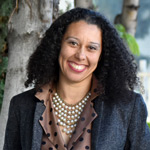
Michelle Bee, LMFT
Michelle Bee is a licensed psychotherapist, author, and program developer. She is currently the new Director of Advance LA for The Help Group. As a program director, Michelle is passionate about providing workshops and conferences to promote education to clients, families, professionals and community members. Michelle is an active member of the National Association of Poetry Therapy (NAPT), California Association of Marriage and Family Therapists (CAMFT), and serves as Co-Chair on the Los Angeles CAMFT expressive arts committee.
She has been published in the Museletter, the official NAPT newsletter, and the Los Angeles CAMFT newsletter. She received her Master’s Degree in psychology from Chapman University in Orange, CA and her Bachelor’s Degree in psychology and political science from California State University, Long Beach.
Her professional background includes a broad range of impactful leadership applying creative and innovative solutions to common treatment challenges. Michelle purposefully uses collaborative partnerships to craft holistic and sustainable projects. Her clinical foundation includes evidence-based research in mental health, chemical dependency and clinical best practices. She has worked with the 0-5 years population, youth/teens, adults and families.
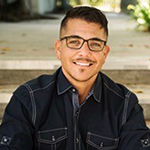
Aydin Olson-Kennedy, LCSW
Aydin Olson-Kennedy, LCSW, is the executive director of the Los Angeles Gender Center where he provides therapy for gender-nonconforming and transgender youth, adults, and their families. He has spoken internationally on the importance of an informed-consent model of care, identifying and acknowledging domains of privilege and broadening clinicians and families understanding of gender dysphoria and its impact on the psychosocial well-being of gender-nonconforming and transgender individuals.
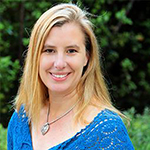
Johanna Olson-Kennedy, M.D.
Johanna Olson-Kennedy, MD, is an Adolescent Medicine physician specializing in the care of gender non-conforming children and transgender youth. Board certified in Pediatrics and Adolescent Medicine, Dr. Olson-Kennedy has been a clinician researcher at Children’s Hospital Los Angeles for the past eleven years. She has been providing medical intervention for transgender youth and young adults including puberty suppression and cross sex hormones for the past eleven years, and is considered a national expert in this area.
Dr. Olson-Kennedy is an Associate Professor at USC Keck School of Medicine and is the Medical Director of The Center for Transyouth Health and Development at Children’s Hospital in Los Angeles. The Center for Transyouth Health and Development is the largest transgender youth clinic in the United States. Dr. Olson-Kennedy has appeared frequently on national television, and spoken all over the country to educate providers, parents, and other communities about the needs of transgender youth.
SESSION 2
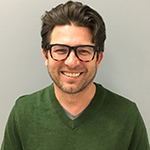
Jason Bolton, Psy.D.
Dr. Jason Bolton has over 25 years of experience working with children, adolescents and families with histories of abuse and neglect, social-emotional challenges, and developmental disabilities including autism spectrum disorder and learning differences. He holds a B.A in Psychology from the University of Oklahoma, an M.S. in Applied Behavioral Studies from Oklahoma State University, and a doctorate in Clinical Psychology from the California School of Professional Psychology in Alameda. He is The Help Group’s Vice President of Programs and previously served the agency as its Clinical Director and Chief Psychologist. In addition to clinical work, Dr. Bolton’s expertise includes effective leadership of diverse work groups, innovative program development, and responsible fiscal oversight of quality programs. He is a member of the Board of Directors and Finance Chair of the California Association of Private Special Education Schools and Agencies, known as CAPSES. Dr. Bolton is a proud father of triplet girls and, as a parent-consumer of developmental and special education services, frequently refers to his family as a glowing example of the power of early intervention.

Aydin Olson-Kennedy, LCSW
Aydin Olson-Kennedy, MSW, is the executive director of the Los Angeles Gender Center where he provides therapy for gender-nonconforming and transgender youth, adults, and their families. He has spoken internationally on the importance of an informed-consent model of care, identifying and acknowledging domains of privilege and broadening clinicians and families understanding of gender dysphoria and its impact on the psychosocial well-being of gender-nonconforming and transgender individuals.

Johanna Olson-Kennedy, M.D.
Johanna Olson-Kennedy, MD, is an Adolescent Medicine physician specializing in the care of gender non-conforming children and transgender youth. Board certified in Pediatrics and Adolescent Medicine, Dr. Olson-Kennedy has been a clinician researcher at Children’s Hospital Los Angeles for the past eleven years. She has been providing medical intervention for transgender youth and young adults including puberty suppression and cross sex hormones for the past eleven years, and is considered a national expert in this area.
Dr. Olson-Kennedy is an Associate Professor at USC Keck School of Medicine and is the Medical Director of The Center for Transyouth Health and Development at Children’s Hospital in Los Angeles. The Center for Transyouth Health and Development is the largest transgender youth clinic in the United States. Dr. Olson-Kennedy has appeared frequently on national television, and spoken all over the country to educate providers, parents, and other communities about the needs of transgender youth.
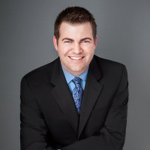
Tom Iland, CPA
Tom lland graduated from California State University Northridge and is a Certified Public Accountant. Diagnosed with autism at 13, he worked hard to achieve his goals including working, driving, living on his own and becoming a Distinguished Toastmaster. Tom offers unique insights with heart and humor in his engaging presentations on topics including employment, relationships, safety, and the benefits of telling someone about their autism. Tom’s award-winning new book, Come to Life! Your Guide to Self-Discovery is the ideal prequel to transition planning, helping self-advocates and their allies find answers to the essential questions that shape the transition to adulthood.
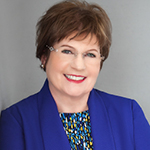
Emily Ann Iland, M.A.
Emily Iland, M.A., is an award-winning author, advocate, film-maker, researcher and leader in the autism field. As the mother of a young man with autism who is a proud Help Group alum, Emily brings personal experience and insight to her professional roles. She is an educational consultant and adjunct professor in the Department of Special Education at California State University, Northridge. Emily is in high demand as a bilingual trainer and presenter in the US and abroad on almost every topic related to autism. Her many projects include curriculum and program development for autism awareness, safety, reading comprehension, inclusion and equity. She is the past President of the Autism Society of Los Angeles and co-founder of the Santa Clarita Autism Asperger Network

Jessica McCabe
Jessica McCabe is the creator and host of “How to ADHD,” a YouTube series committed to educating and supporting ADHD brains around the world. Her outreach and message have been featured by Upworthy, ADDitude Magazine, Today.com, and in her recent TEDx Talk. She posts new episodes for her subscribers every week at howtoadhd.com.
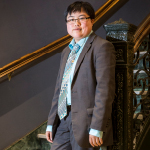
Lydia X. Z. Brown
Lydia X. Z. Brown is a disability justice advocate, organizer, and writer whose work has largely focused on violence against multiply-marginalized disabled people, especially institutionalization, incarceration, and policing. They have worked to advance transformative change through organizing in the streets, writing legislation, conducting anti-ableism workshops, testifying at regulatory and policy hearings, and disrupting institutional complacency everywhere from the academy to state agencies and the nonprofit-industrial complex.
At present, Lydia serves as founding board member of the Alliance for Citizen-Directed Services, stakeholder representative to the Massachusetts One Care Implementation Council overseeing health care for Medicaid/Medicare dually-eligible individuals, and board member of the Autism Women’s Network. Lydia recently completed a term as Chairperson of the Massachusetts Developmental Disabilities Council, serving in that role from 2015 to 2017 as the youngest appointee nationally to chair any state developmental disabilities council. In collaboration with E. Ashkenazy and Morénike Giwa-Onaiwu, Lydia is the lead editor and visionary behind All the Weight of Our Dreams, the first-ever anthology of writings and artwork by autistic people of color, published by the Autism Women’s Network in June 2017.
Most recently, Lydia has designed and teaches a course on critical disability theory, public policy, and intersectional social movements as a Visiting Lecturer at Tufts University’s Experimental College, beginning in Fall 2016. Lydia is a past Holley Law Fellow at the National LGBTQ Task Force, where they focused on reproductive justice and disability rights policy issues, and past Patricia Morrissey Disability Policy Fellow at the Institute for Educational Leadership, where they focused on employment opportunities for people with significant disabilities. Lydia also worked for the Autistic Self Advocacy Network for several years as part of the national public policy team, where Lydia worked on various issues relating to criminal justice and disability, healthcare disparities and service delivery models, and research and employment disparities.
Lydia has been honored by the White House, Washington Peace Center, National Council on Independent Living,Disability Policy Consortium of Massachusetts, National Association for Law Placement/Public Service Jobs Directory, Society for Disability Studies, and American Association of People with Disabilities. In 2015, Pacific Standard named Lydia a Top 30 Thinker under 30, and Mic named Lydia to its inaugural list of 50 impactful leaders, cultural influencers, and breakthrough innovators. Their work has been featured in scholarly publications including Addressing Ableism: Philosophical Meditations via Disability Studies; Religion, Disability, and Interpersonal Violence; Barriers & Belonging: Personal Narratives of Disability; Feminist Perspectives on Orange is the New Black; Torture in Healthcare Settings; Films for the Feminist Classroom; and community publications including The Asian American Literary Review; QDA: A Queer Disability Anthology; Criptiques; Tikkun; Rewire; Disability Intersections; Black Girl Dangerous; hardboiled magazine; POOR Magazine; The Washington Post; NOS Magazine; Sojourners; and The Establishment.
Lydia is now a Public Interest Law Scholar at Northeastern University School of Law, where they serve as an active member of the Committee Against Institutional Racism (representing the Asian Pacific American Law Students Association), the Transgender Justice Task Force, and the Faculty Appointments Committee, and are a founding core collective member of the Disability Justice Caucus.
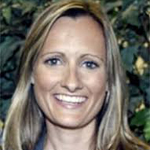
Amy Griffiths, Ph.D., NCSP, BCBA-D
Dr. Amy-Jane Griffiths holds a Ph.D. in Counseling, Clinical, and School Psychology from the University of California, Santa Barbara. She is a licensed psychologist and a nationally certified school psychologist. Dr. Griffiths is an Assistant Professor in the Attallah College of Educational Studies at Chapman University and a Research Affiliate of the Thompson Policy Institute. Her expertise and experiences center around systems change; supporting youth and families from underserved communities; improving the transition to adult life for at-risk youth; and collaborative approaches to academic and mental health intervention.
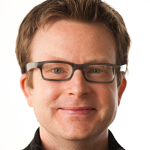
Elisha Goldstein, Ph.D.
Elisha Goldstein, Ph.D. is co-founder of The Center for Mindful Living in West Los Angeles and creator of the 6-month mentorship program A Course in Mindful Living. He is a psychologist, speaker and author who has published numerous articles, chapters, and biogs, including Uncovering Happiness: Overcoming Depression with Mindfulness and Self-Compassion, The Now Effect: How This Moment Can Change the Rest of Your Life and co-author of A Mindfulness-Based Stress Reduction Workbook, foreword by Jon Kabat-Zinn and MBSR Every Day. He synthesizes the pearls of traditional psychotherapy with a progressive integration of mindfulness to achieve mental and emotional healing. He has his private practice in West Los Angeles, California.
LUNCH SESSION

Rabbi Naomi Levy
National bestselling author of To Begin Again, Talking to God, Hope Will Find You and Einstein and the Rabbi; Founder of Nashuva, a groundbreaking Jewish spiritual outreach movement; Named one of the top-fifty rabbis by Newsweek; Has appeared on The Oprah Winfrey Show, the Today Show and NPR
SESSION 3
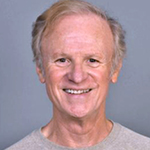
Robert Koegel, Ph.D.
Founding Director of the Koegel Autism Center at UC Santa Barbara; International authority in the area of autism, publishing over 200 articles and papers, and six books; Distinguished Professor; Senior Researcher at Stanford University School of Medicine; Recipient of numerous multi-million dollar research and training grants from NIH, NIMH, and DOE.
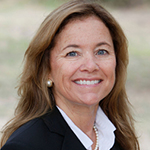
Lynn Koegel, Ph.D.
Founding Clinical Director of the Koegel Autism Center at UC Santa Barbara; Co-author and Co-editor of major textbooks on autism; Co-author of the best-selling book, Overcoming Autism: Finding the Answers, Strategies, and Hope that Can Transform a Child’s Life; Developed and published procedure manuals used in school districts throughout the world; Clinical Professor at Stanford University School of Medicine.
SESSION 4
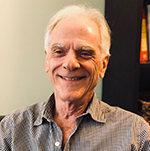
Ellis Crasnow, Ph.D.
After earning his PhD in philosophy from USC, Dr. Crasnow taught widely at the college and high school levels, both in the U.S. and South Africa. He secured his CA teaching credential and joined The Help Group in 2008, teaching math, science and English before becoming Principal of Village Glen High School. In 2012, The Help Group began a pilot program at Village Glen High School, which Dr. Crasnow led. The success of that program and its expansion to include STEM infusion into the middle and elementary schools’ curriculum provided the impetus to start STEM³ Academy.
Prior to teaching, Dr. Crasnow was a successful entrepreneur. He has two daughters, both in doctoral programs in the University of California system, and is an avid hiker and photographer. Dr. Crasnow is a frequent speaker at conferences, including the annual California STEM Symposium on the importance of STEM education and its benefit to those with social and learning differences. He also produces a weekly blog, which can be found here.
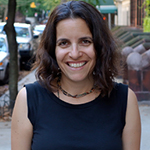
Yael Enav, Ph.D.
Dr. Yael Enav is a clinical psychologist with over 15 years of experience working and treating in Israel and USA. Yael completed her master’s degree in child clinical psychology at Tel Aviv University, and her PhD degree in Clinical psychology at Ben Gurion University. Her doctoral dissertation focused on anger and sadness and the role they play in therapy. She worked extensively with children, adolescents and their parents in leading mental health institutions in Israel. Yael moved four years ago to Palo Alto, California.
Today she is part of the psychophysiology lab at Stanford University, leading a study about emotion regulation within children with ASD and their parents. In parallel, she is doing her post-doc clinical internship in the faculty staff help center, at Stanford University and in a private practice in Palo Alto.
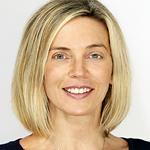
Victoria Dunckley, M.D.
Integrative Child, Adolescent and Adult Psychiatrist at the Centre for Life in Los Angeles and the Westside Regional Center; nationally recognized expert on technology addiction and screen-time’s impact on the developing nervous system; advisory board member for Families Managing Media, Physicians for Safe Technology, and the Screen Time Action Network; author, Reset Your Child’s Brain: A Four Week Plan to End Meltdowns, Raise Grades, and Boost Social Skills by Reversing the Effects of Electronic Screen Time.
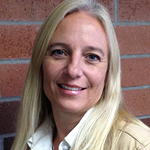
Mary Baker-Ericzén, Ph.D.
Dr. Mary Baker-Ericzén is a Research Scientist and Operations Director of the Child and Adolescent Services Research Center (CASRC) at Rady Children’s Hospital, San Diego. She is also the director of the new AASPIREus center (Across the Autism Spectrum Promoting Individuals, Research, Education: Uniting Systems) and the director of the Intricate Mind Institute, a community mental health clinic specializing in developmental and neurological disorders as ASD, ADHD, Tourette’s and co-occurring mental health conditions as anxiety, depression and emotional dysregulation in San Diego.
She is both a researcher and a practicing clinical psychologist with over 27 years working with individuals with autism spectrum and related conditions. She is the founder and leader of the adult ASD research-community partnership called ACHIEVE group (Active Community Hub of Individuals with ASD to Enhance Vocational and Educational outcomes).
She is also the developer of the SUCCESS (Supported employment, Comprehensive Cognitive Enhancement and Social Skills) vocational soft skills training program, the College SUCCESS educational soft skills course and the Transition Age Youth SUCCESS programs.
She is a National Institutes of Mental Health and foundation funded researcher conducting services research for individuals with ASD from youth to adults. She currently has 2 prestigious NIMH grants to develop cognitive based interventions for adults and transition age youth with autism spectrum conditions. She has written over 60 articles and book chapters in child and adult developmental and mental health conditions and is on various service committees across San Diego County. She is the mother of 2 boys and thrilled to participate in community conferences exchanging knowledge and experiences.
Select Presentations
Next Generation Interventions: Moving Beyond Behaviors to Cognitions (Executive Functioning and Social Cognitive Skills) for Teens and Adults
Mary Baker-Ericzén, Ph.D.
Finding Strength in Diversity: Crafting a New Narrative
Michelle Bee, LMFT
Wired and Tired: Electronic Fast as the Missing Link in Treating ADHD, ASD and Depression in Teens and Young Adults
Victoria Dunckley, M.D.
Parents – Think and Rethink: Emotional Regulation While Parenting Teens and Young Adults with Autism
Yael Enav, Ph.D.
Toward Sustainable Happiness: Uncovering Our Greatest Strengths in the Midst of Life’s Challenges
Elisha Goldstein, Ph.D.
Connecting the Dots: Employer Perspectives on Creating Meaningful Employment Opportunities for Young Adults with Diverse Needs
Amy Griffiths, Ph.D., NCSP, BCBA-D
Decreasing Barriers to Education and Employment for Young Adults with ASD
Robert Koegel, Ph.D. and Lynn Koegel, Ph.D.
Panel Discussion – “Our Stories: Strengths in Differences”
Tom Iland, CPA, Emily Ann Iland, M.A.
Thriving Through Friendships: Improving Outcomes for Young Adults with Autism Spectrum Disorder
Elizabeth Laugeson, Psy.D.
The Next Frontier: Neurodiversity in the Workplace
Lindsey Sterling, Ph.D.
